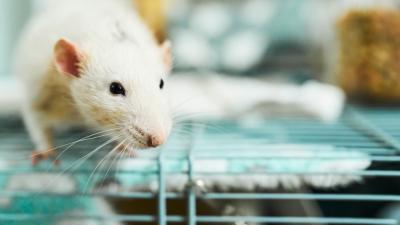U.S. Taxpayers Have No Idea How Many Animals Are Used in Government-Funded Labs. A New Federal Bill Would Change That.
The Animal Welfare Act covers only about 5% of animals used in labs; the remainder are unknown

WASHINGTON, D.C.—A bipartisan group of federal lawmakers has introduced legislation that would require the National Institutes of Health to begin accurately counting the number of animals used and held in hundreds of government-funded laboratories. The Federal Animal Research Accountability Act (HR 3295), led by Reps. Nicole Malliotakis (R-N.Y.), Don Davis (D-N.C.), and Jen Kiggans (R-Va.) addresses what advocates say is a serious lack of transparency by the U.S. government.
The Physicians Committee for Responsible Medicine, a nonprofit medical ethics group supporting this legislation, points out that the European Union, United Kingdom, and Canada all collect and disclose to the public detailed information about the number of animals used in experiments. In comparison, the NIH, which annually awards about $20 billion worth of grants involving animals to more than 800 facilities, currently collects only crude estimates every four years. In addition, the estimates are only accessible through monthslong Freedom of Information Act requests.
“It’s time to bring government-funded animal experiments out of the shadows,” said Ryan Merkley, director of research advocacy at the Physicians Committee. “The NIH says it is committed to reducing the number of animals in research, so we hope it will support this bill. We are grateful to Reps. Malliotakis, Davis, and Kiggans for leading this important effort.”
The new legislation is endorsed by more than 20 other organizations and companies, including the Johns Hopkins Toxicology Policy Program, the Animal Welfare Institute, the Government Accountability Project, the Institute for In Vitro Sciences, and the National Freedom of Information Coalition.
Under the Federal Animal Research Accountability Act, a facility that receives funding from the NIH or another agency within the U.S. Public Health Service would annually file a short form with the NIH that lists the number of animals used in the previous fiscal year, sorted by species and level of pain and distress. The NIH would then post those forms online for the public to access.
“Millions of innocent animals have been used for science, but with modern technological advancements, it is past time to completely move away from animal experiments unless absolutely medically necessary,” said Rep. Malliotakis. “The FDA’s recent announcement is hopeful, and NIH should follow suit. Until the phase out is complete, we must demand transparency and track how many animals continue being held in government-funded laboratories.”
“Public health research requires transparency, and it is imperative that the NIH actively gather and disseminate this vital information,” said Rep. Don Davis.
Rep. Kiggans added, “With the rapid advancement of innovative research technologies, we have a responsibility to rethink the routine use of innocent animals in government-funded experiments. While science continues to evolve, transparency is absolutely essential—especially when it comes to taxpayer-funded research. By requiring the NIH to account for the animals in its labs, the Federal Animal Research Accountability Act is a long-overdue step toward more ethical and accountable research practices.”
The NIH’s lack of disclosure means the agency lags behind the U.S. Department of Agriculture, which requires accurate annual reporting of animals covered under the Animal Welfare Act and posts the information to its public database, a system that inspired the new legislation. However, the Animal Welfare Act covers only about 5% of all animals used in laboratories, while the remaining 95% fall under the NIH’s purview. Estimates of the number of animals used each year in U.S. laboratories vary wildly—from 10 million to 110 million—with most of those animals likely used by federally funded facilities.
To interview Mr. Merkley or see the legislation, please contact Leslie Raabe at 202-527-7319 or lraabe [at] pcrm.org.
Media Contact
Leslie Raabe
202-527-7319
lraabe[at]pcrm.org
Founded in 1985, the Physicians Committee for Responsible Medicine is a nonprofit organization that promotes preventive medicine, conducts clinical research, and encourages higher standards for ethics and effectiveness in education and research.







